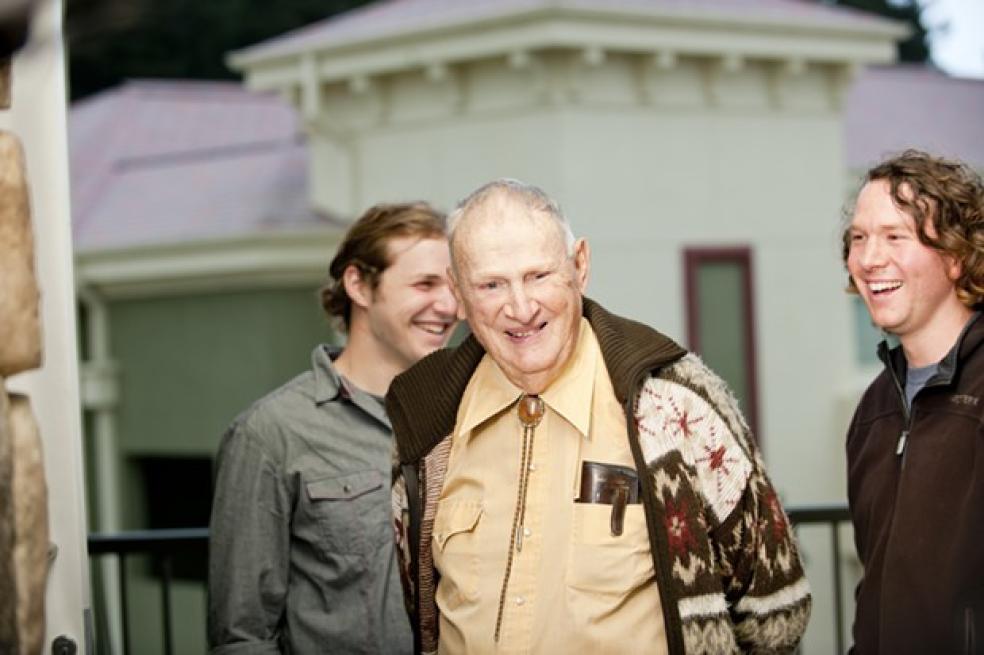
Stanley Harris at a scholarship reception at Humboldt State University
February 5, 2020—Stanley Harris, who passed at the age of 91 on December 27, was a Wildlife professor at Humboldt State University for 33 years. He helped build the HSU Wildlife department into one of the best in the country and played a big part in creating the Arcata Marsh & Wildlife Sanctuary.
Professor Harris, along with his wife Lorene, who passed in 2012, were strong advocates of education and supporters of students. One way they did this was through endowing three scholarships in 2003 to support HSU Wildlife students: The Stanley W. Harris Scholarship and the Lorene J. Harris Scholarship for undergraduate students, and the Stanley W. and Lorene J. Harris Scholarship for graduate students. Since the original creation of the Harris’ scholarships, more than 45 students have benefited—a number that grows each year as the scholarships have been set up to operate in perpetuity.
Many of the students who have benefitted from the scholarships have used the funds for their research and gaining experience in the field, which Professor Harris was a huge proponent of.
Receiving the Lorene J. Harris Scholarship allowed Sara Moriarty-Graves (‘19, Wildlife) to volunteer over 400 hours, gaining valuable experience that has made her more qualified for positions in her field. Sara sees the impact of Professor Harris’s legacy beyond the funding. “He has inspired me to make lasting positive impacts for wildlife,” she says.
Adam Mohr is a Wildlife graduate student who came to HSU in part because of the department’s reputation Professor Harris had a hand in building. A recipient of the Stanley W. and Lorene J. Harris Scholarship, Adam used the funds to support his thesis work studying elk populations. The money allowed him to visit his fieldwork sites, as well as to present his findings at wildlife conferences around the country.
Adam never got the chance to meet Professor Harris, but says he appreciates how Professor Harris “realized the importance of the development of the new generation of wildlife researchers and managers.”
Professor Harris certainly influenced new generations of wildlife researchers and managers. Michael Harris, Professor Harris’s son, saw how his father was instrumental in students’ careers, saying, “he was very committed to supporting his students, doing everything he could to be able to find them jobs later in the field.” According to Mark Colwell, an HSU Wildlife professor who counts Professor Harris as a mentor and friend, you can find one of his pupils working in most of the federal agencies around the country. Long after Professor Harris’s retirement, Mark recalls how he’d often see Professor Harris when he’d be taking his students on an Arcata Marsh field trip.
Professor Harris remained committed to teaching students long after retirement. Will Goldenberg (‘08 Wildlife Management BS, ‘13 Wildlife Management MS) recalls Professor Harris coaching him and other students for the Wildlife Conclave Quiz Bowl.“There was lots of laughing, joking, and ‘Doc Harris’ telling stories from the old days,” he says. “We truly valued those sessions.”
Will also received the Stanley W. Harris scholarship as an undergrad and credits the scholarship for being the springboard to his career as a wildlife cinematographer. The funding went directly to creating a short film about shorebirds in Humboldt County, which went on to garner local and international awards. Since HSU, Will has traveled the world working with outlets such as BBC, National Geographic, and Discovery Channel, through his career in the natural history film industry.
“Knowing that my film was in part funded by an award from Doc Harris gave a certain gravity to my work and elevated my ambitions to create a film that he would have been proud of,” says Will.
The financial support the Harris’ are providing HSU students has a major impact on the ability of students to not just fund, but focus on, their studies and research.
Thanks to the funds she received from the Lorene J. Harris Scholarship, HSU student Jaime Carlino was freed up to gain more experience working in the field researching barn owls. Jaime’s ultimate goal echoes the impact Professor Harris had on students: “to pursue a life dedicated to making a positive contribution to wildlife around the world through research and education.”
Brissa Kamakaniokekai Christophersen also came to HSU because of the Wildlife department’s strong reputation, noting that she “immediately knew I wanted to immerse myself in it.” As an out-of-state student coming from a low-income family, Brissa was struggling with food and housing security before she was awarded the Stanley W. Harris Scholarship. Receiving the scholarship helped ease this burden, and Brissa plans to pursue a graduate degree with the goal of working for a non-profit organization or federal agency.
Like other students, Brissa is grateful for Professor Harris’s support. “I’m thankful for his investment in the future of wildlife conservation,” she says. “His legacy will live on through us.”
To honor Professor Harris, gifts can be made to the Harris’ endowed scholarships online. For more information, please contact the HSU Foundation at 707-826-5200 or giving@humboldt.edu.